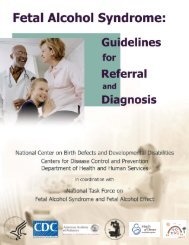FETAL ALCOHOL SPECTRUM DISORDERS florida resource guide
FETAL ALCOHOL SPECTRUM DISORDERS florida resource guide
FETAL ALCOHOL SPECTRUM DISORDERS florida resource guide
- No tags were found...
You also want an ePaper? Increase the reach of your titles
YUMPU automatically turns print PDFs into web optimized ePapers that Google loves.
SECTION 3FAS: Fact and FictionSeven Myths of FAS/FAEMyth #1 – People with FAS/FAE always have mental retardation. Althoughit is true that FAS/FAE is caused by prenatal brain damage and every personwith FAS/FAE has specific, individualized cognitive strengths andweaknesses, not all people with FAS/FAE have mental retardation. Forexample, as one study found, only 25% of 178 individuals with the full FASwere classified as having mental retardation by an IQ score below 70(Streissguth, Barr, Kogan, & Bookstein, 1996). In fact, it is possible for anindividual with FAS/FAE to have an IQ score within the normal range.FAS/FAE diagnostic centers, such as the one at the University of WashingtonMedical School, see individuals with broad spectrum of IQ scores (Clarren& Astley, 1997). Only the most severely affected children — those with clearmicrocephaly and other physical malformations — are easily detected atbirth (Darby, Streissguth, & Smith, 1981).Myth #2 – The behavior problems associated with FAS/FAE are the resultof poor parenting or a bad environment. Because people with FAS/FAE areborn with some brain damage, they do not process information in the sameway as most people and do not always behave in a manner that others expectthem to. This brain damage, in fact, can permeate even the bestenvironments to cause behavior problems and present parenting challenges.Parents and caregivers need help and support, not criticism. Of course, aloving and understanding environment helps a child with FAS/FAE. But itsabsence isn’t the primary cause of the disability.Myth #3 – Admitting that children with FAS/FAE have brain damagemeans that society has given up on them. Some people believe thatacknowledging the brain damage that accompanies FAS/FAE will depictthese individuals as hopeless and devoid of treatment options. Yet, societyspends millions of dollars developing treatment procedures for children bornwith more obvious birth defects and for people sustaining brain damage inmore noticeable ways (e.g., auto accidents). As of 1997, the research tounderstand and ameliorate the specific neuropsychological and cognitiveimpairments associated with FAS/FAE has not yet been conducted. Theseindividuals are in no way hopeless, but their needs have been sadlyoverlooked in the allocation of societal <strong>resource</strong>s.Myth #4 – Children eventually outgrow FAS/FAE. FAS/FAE lasts a lifetime,although its manifestations and associated complications vary with age.Children with brain damage (including those with FAS/FAE) usually requirea longer period of sheltered living, and many need a stronger than usualsupport system to achieve their best level of adaptive living. Understandingthis can help families plan effectively for structured transitions betweenschool and work and can help them spare their children with FAS/FAE theexpectation that they should be or must be independent at age 18, or that itis shameful to ask for help.16 <strong>FETAL</strong> <strong>ALCOHOL</strong> <strong>SPECTRUM</strong> <strong>DISORDERS</strong> <strong>florida</strong> <strong>resource</strong> <strong>guide</strong>



